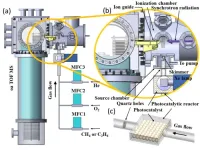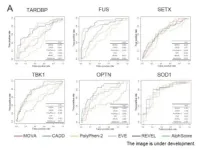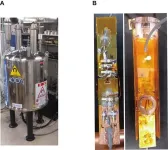(Press-News.org) Increased levels of Lipoprotein(a), a variant of ‘bad cholesterol’, in the bloodstream are a risk factor for recurrent coronary heart disease (CHD) in people aged 60 or over, according to the results of a new study which tracked the issue over the course of 16 years.
The results, published today in Current Medical Research & Opinion, suggest that current cholesterol-lowering medications may not be effective at reducing the risk of recurrent CHD – such as a heart attack – due to elevated Lp(a).
“This finding adds to growing evidence of a relationship between increased Lp(a) and the risk of recurrent CHD,” says lead author Associate Professor Leon Simons, from the School of Clinical Medicine, at the University of New South Wales Sydney. “It is well-established that people who have already experienced CHD are at very high risk of another event. Our new results indicate that new therapeutics in development that aim to reduce elevated Lp(a) might help prevent recurrent disease. However, the potential clinical benefit of therapy to reduce elevated Lp(a) is yet to be confirmed.”
CHD is the most common type of heart disease. It occurs when the arteries that supply the heart with oxygen-rich blood become narrowed by a build-up of fatty material within their walls. It is the most common cause of heart attack and was the single biggest killer of both and men and women worldwide in 2019.
High levels of cholesterol in the blood can increase the risk of CHD. Cholesterol travels through the blood on lipoproteins, which are made of protein and fat. Lipoproteins include low-density lipoprotein (LDL), high-density lipoprotein (HDL) and Lp(a). LDL cholesterol is often called ‘bad cholesterol’ because it collects in blood vessel walls, increasing the chances of cardiovascular disease. Lifestyle changes and/or medications, like statins, may help to get a person’s cholesterol numbers into the healthy range.
While previous research has indicated that high levels of Lp(a) are also an important risk factor in the development of CHD, most of these studies have looked at Lp(a) levels and the risk of a first CHD event. The current study looked at whether elevated Lp(a) is predictive of a second or recurrent CHD event. It involved 607 Australians aged 60 years and over, all with prevalent CHD, who were followed for 16 years as part of the Dubbo study. There were 399 incident CHD cases.
The researchers found that:
The median Lp(a) in people who had a recurrent CHD event was 130 mg/L, compared to 105 mg/L in those who did not.
26% of people who had a recurrent CHD event – and 19% of those who did not – had Lp(a) levels of >300 mg/L.
18% of people who had a recurrent CHD event – and 8% of those who did not – had Lp(a) levels of >500 mg/L.
In senior citizens with prior CHD, elevated Lp(a) in the top 20% of the population distribution (>355 mg/L) predicted a 53% excess risk of a recurrent CHD event, compared with those in the lowest 20% of the population distribution (<50 mg/L) over 16 years of follow-up. This prediction was independent of other risk factors.
“We conclude that elevated Lp(a) is an important predictor of recurrent CHD in older people. Upper reference Lp(a) levels of 500 mg/L or 300 mg/L both appear to be appropriate for identifying those at higher risk who may benefit from more intensive risk reduction interventions,” says Associate Professor Simons. “While current medications, such as statins, are often prescribed to lower ‘bad cholesterol’ in patients at higher risk of cardiovascular disease, these do not have any major or proven impact on elevated Lp(a). But there is hope for the future – as some novel therapeutics that are designed to lower the levels of Lp(a) are currently in the advanced stages of clinical development.”
A key limitation of this longitudinal study is that the baseline data were collected in 1988-89. However, while there may have been other influences affecting CHD risk over the years of follow-up, especially with the use of statin therapy, it can be reasonably assumed that people with elevated Lp(a) at the start of the study will maintain that status during the whole period.
END
Elevated Lipoprotein(a) is the latest variant of ‘bad cholesterol’ found to increase the risk of recurrent coronary heart disease
Future therapeutics to reduce elevated Lp(a) might help prevent recurrent disease
2023-06-13
ELSE PRESS RELEASES FROM THIS DATE:
USTC achieves breakthrough in in-situ detection of gas-phase active intermediates in photocatalysis
2023-06-13
Prof. PAN Yang and Associate Researcher LIU Chengyuan, researchers from the University of Science and Technology of China (USTC) of the Chinese Academy of Sciences (CAS), have achieved significant progress in detecting intermediates in methane photocatalytic reactions. Their technique, Synchronous Radiation Photoionization Mass Spectrometry (SR-PIMS), allows for in-situ detection of active intermediates. The findings were published in the prestigious chemistry journal Angewandte Chemie International ...
USTC provides comprehensive review of quantum teleportation in Nature Review Physics
2023-06-13
A team led by Academician Prof. GUO Guangcan from the Chinese Academy of Sciences (CAS) provides a comprehensive overview of the progress achieved in the field of quantum teleportation. The team, which includes Prof. HU Xiaomin, Prof. GUO Yu, Prof. LIU Biheng, and Prof. LI Chuanfeng from the University of Science and Technology of China (USTC),CAS, was invited to publish a review paper on quantum teleportation in Nature Review Physics. The paper was officially released online on May 24.
As one of the most important protocols in the field ...
USTC achieves thousand-kilometer quantum key distribution
2023-06-13
A point-to-point long-distance quantum key distribution (QKD) over a distance of 1,002 km has been achieved by scientists from the University of Science and Technology of China (USTC) of the Chinese Academy of Sciences (CAS), and their collaborators from Tsinghua University, Jinan Institute of Quantum Technology, and Shanghai Institute of Microsystem and Information Technology (SIMIT), CAS. This milestone not only sets a new world record for non-relay QKD but also provides a solution for high-speed intercity quantum communication. The ...
ASHP Summer Meeting Tip Sheet
2023-06-13
Posters
All poster presentations will take place on Monday, June 12, 2023, from 12:15 to 1:30 p.m. EDT, or Tuesday, June 13, 2023, from 12:15 to 1:30 p.m. EDT at the Baltimore Convention Center, Exhibit Hall E, Level 100.
Abstract 4-M (Monday)
Avoiding Clinical Inertia: Comparing Time to Intensification of Glucagon-like
peptide-1 (GLP-1) Receptor Agonists in Patients with Type 2 Diabetes Mellitus Among Clinical Pharmacists versus Providers
Clinical pharmacists have a significant impact on medication optimization and reduction ...
MOVA: new method for evaluating the pathogenicity of missense variants using AlphaFold2
2023-06-13
Niigata, Japan - The Department of Neurology at Niigata University has developed a new in silico method for evaluating the pathogenicity of missense variants using AlphaFold2 (MOVA). Rare variants in the causative gene of ALS are present in 10-30% of sporadic ALS cases, which highlights the need for accurate and efficient pathogenicity prediction methods. To predict the pathogenicity of the variants, in silico analysis methods are commonly used. In some ALS causal genes, the mutations are concentrated in specific regions, and the accuracy of pathogenicity prediction can be improved by considering the positional information of the variants. ...
23Na MRI technique unleashes new approach for diagnosing diabetic kidney disease
2023-06-13
Niigata, Japan - The gold standard test for predicting the onset of diabetic kidney disease is albuminuria. However, detecting albuminuria alone has limited sensitivity and specificity in end-stage renal failure with a decreased estimated glomerular filtration rate. This is supported by several reports, which state that about half of the type 2 diabetes patients who developed kidney dysfunction showed no preceding albuminuria.
In this study, the authors propose the possibility of diagnosing tubular abnormalities in diabetic kidney disease at an early stage and connecting them to treatment by combining the evaluation of sodium concentration using 23Na MRI ...
Immune cell movement worse in older females, mice study finds
2023-06-13
Older female mice had more immune cells entering areas of the body where they shouldn’t according to a new study, demonstrating that sex differences contribute to age-related inflammation that needs to be considered in future research.
In a paper published in Journal of Leukocyte Biology today (Tuesday 13 June), at team of researchers led by Dr Myriam Chimen from the University of Birmingham have found that age significantly increases the number of immune cells entering the sack that holds major organs (peritoneal cavity) in female mice, when compared to young mice or older male mice.
The findings support previous studies that suggest ...
THE LANCET: First phase 3 trial of a chikungunya vaccine candidate finds it is generally safe and provokes an immune response
2023-06-13
Peer-reviewed / Randomised Controlled Trial / People
Study of healthy US adults found that a single dose of the VLA1553 vaccine candidate was generally safe, well tolerated and provokes an immune response.
After a single vaccination, the vaccine produced neutralizing antibody levels which are thought to protect against chikungunya disease in 99% (263/266) of participants.
Antibody levels declined 28 days after vaccination, but seroprotection persisted in more than 96% (233/242) participants after six months.
Most adverse events were moderate or mild and the authors say its safety profile is similar to other licensed vaccines
The VLA1553 vaccine candidate ...
The chatbot will see you now:
2023-06-13
Glasgow, UK: The informed consent process in biomedical research is biased towards people who can meet with clinical study staff during the working day. For those who have the availability to have a consent conversation, the time burden can be off-putting. Professor Eric Vilain, from the Department of Paediatrics, University of California, Irvine, USA, will tell the European Society of Human Genetics annual conference today (Tuesday 13 June) how results from his team’s study of the use of a chatbot (GIA – ‘Genetics Information Assistant’ ...
NHS policies on patient’s weight and access to hip replacement surgery are inappropriate, study finds
2023-06-13
Weight and body mass index (BMI) policies introduced by NHS commissioning groups in England are inappropriate and worsening health inequalities, according to a new study published in BMC Medicine today [13 June] that analysed nearly 490,000 hip surgeries. With one in ten people likely to need a joint replacement in their lifetime, many thousands of patients are directly affected by these policies.
Rules implemented by NHS clinical commissioning groups (CCGs) across England to change the access to hip and knee replacement surgery for patients who are overweight or obese have been in effect for over ten years. ...
LAST 30 PRESS RELEASES:
Antipathy toward snakes? Your parents likely talked you into that at an early age
Sylvester Cancer Tip Sheet for Feb. 2026
Online exposure to medical misinformation concentrated among older adults
Telehealth improves access to genetic services for adult survivors of childhood cancers
Outdated mortality benchmarks risk missing early signs of famine and delay recognizing mass starvation
Newly discovered bacterium converts carbon dioxide into chemicals using electricity
Flipping and reversing mini-proteins could improve disease treatment
Scientists reveal major hidden source of atmospheric nitrogen pollution in fragile lake basin
Biochar emerges as a powerful tool for soil carbon neutrality and climate mitigation
Tiny cell messengers show big promise for safer protein and gene delivery
AMS releases statement regarding the decision to rescind EPA’s 2009 Endangerment Finding
Parents’ alcohol and drug use influences their children’s consumption, research shows
Modular assembly of chiral nitrogen-bridged rings achieved by palladium-catalyzed diastereoselective and enantioselective cascade cyclization reactions
Promoting civic engagement
AMS Science Preview: Hurricane slowdown, school snow days
Deforestation in the Amazon raises the surface temperature by 3 °C during the dry season
Model more accurately maps the impact of frost on corn crops
How did humans develop sharp vision? Lab-grown retinas show likely answer
Sour grapes? Taste, experience of sour foods depends on individual consumer
At AAAS, professor Krystal Tsosie argues the future of science must be Indigenous-led
From the lab to the living room: Decoding Parkinson’s patients movements in the real world
Research advances in porous materials, as highlighted in the 2025 Nobel Prize in Chemistry
Sally C. Morton, executive vice president of ASU Knowledge Enterprise, presents a bold and practical framework for moving research from discovery to real-world impact
Biochemical parameters in patients with diabetic nephropathy versus individuals with diabetes alone, non-diabetic nephropathy, and healthy controls
Muscular strength and mortality in women ages 63 to 99
Adolescent and young adult requests for medication abortion through online telemedicine
Researchers want a better whiff of plant-based proteins
Pioneering a new generation of lithium battery cathode materials
A Pitt-Johnstown professor found syntax in the warbling duets of wild parrots
Cleaner solar manufacturing could cut global emissions by eight billion tonnes
[Press-News.org] Elevated Lipoprotein(a) is the latest variant of ‘bad cholesterol’ found to increase the risk of recurrent coronary heart diseaseFuture therapeutics to reduce elevated Lp(a) might help prevent recurrent disease




